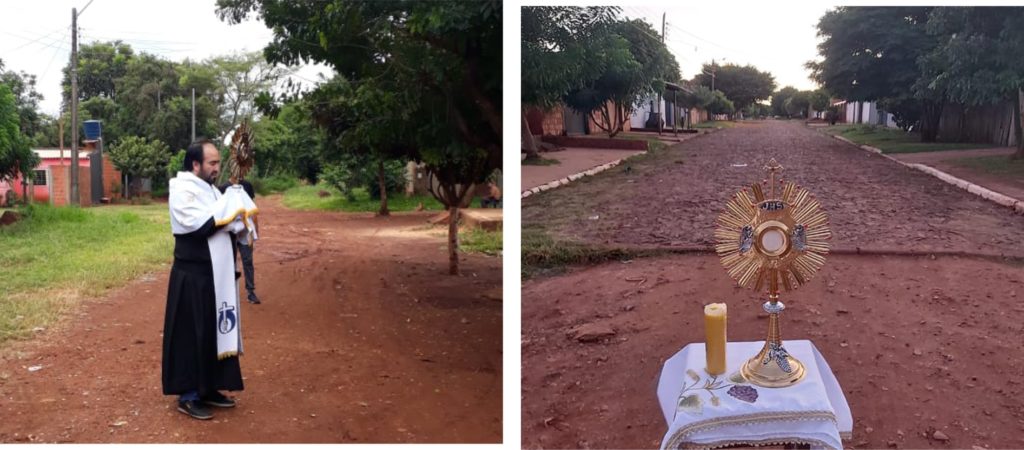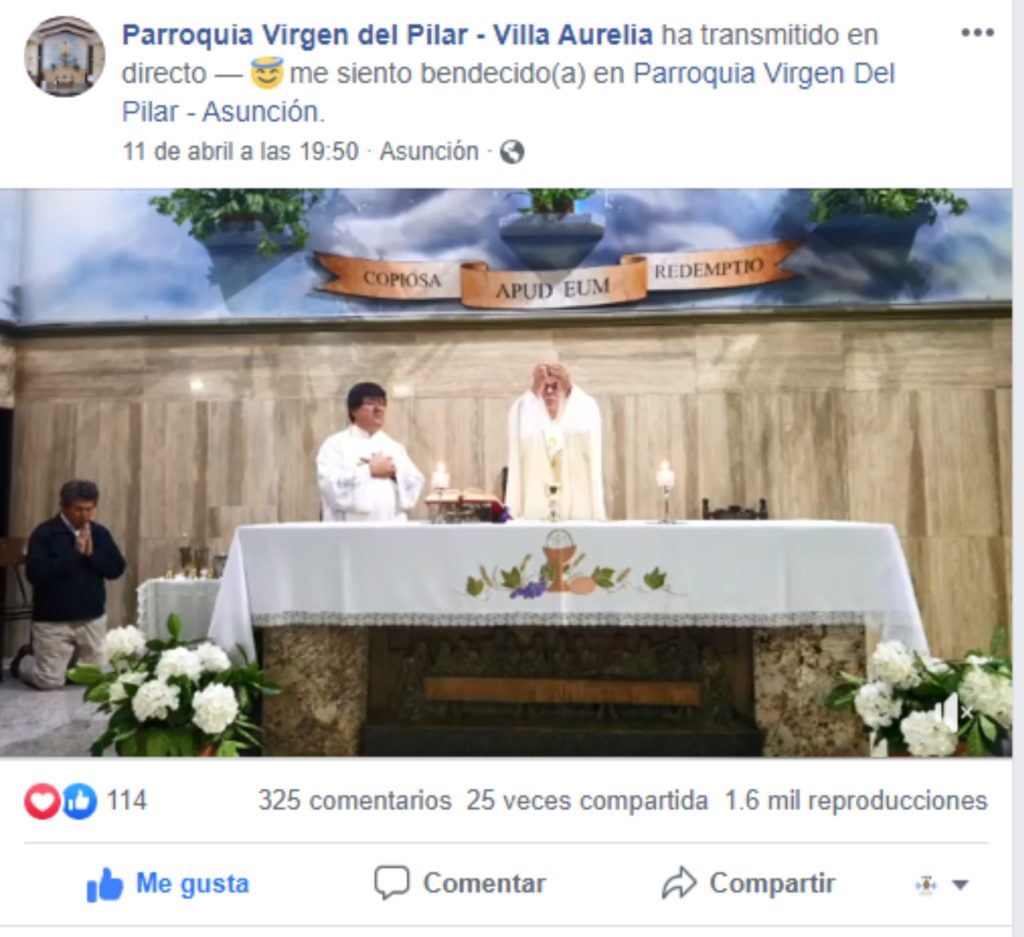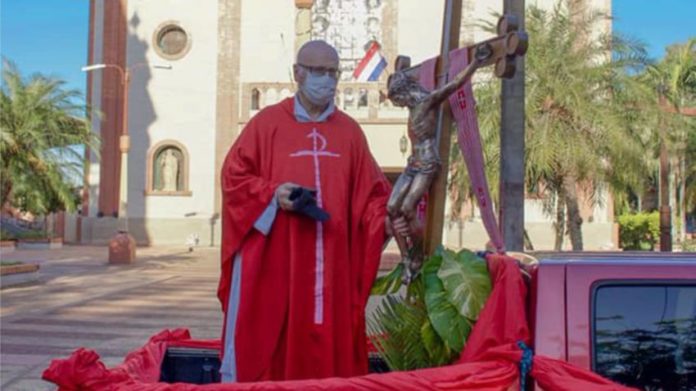COVID-19, a potentially fatal respiratory disease of the coronavirus family, recorded the first positive case on March 7, 2020, and the second on the following day. This fact led the National Government to announce on March 10th a drastic measure, with the enforcement through Sanitary Emergency, decreeing the suspension of classes, the non-aggregation of people, the limitation of work in public and private institutions and the campaign “Epyta nde Rogape” (Stay at Home). These measures, based on the Health Code, were tightened as progress was made, and new confirmations of positive cases were endorsed with the declaration of the coronavirus as a pandemic by the World Health Organization (WHO) on Wednesday, March 11.
This emergency has also led to other social problems. In essence, thousands of Paraguayans have lost their jobs or have entered into a recession, small and medium enterprises have no possibility of generating work, private and subsidized educational institutions with their 30 thousand teachers and administrative and service personnel were relieved, and the response to the most vulnerable sectors with programs such as Pytyvo(social aid and subsidy), Food Security Policy Ñangareko (care), and Tekopora (living well) aimed at protecting and promoting families in a situation of poverty and vulnerability, became deficient and politicized.
The Paraguayan Episcopal Conference also joined the Government’s call to “Stay at Home” by rethinking everything related to liturgical celebrations and meetings of the various parish groups.

“Because of the confirmation of the presence of the Coronavirus by the Ministry of Public Health of our country, the Permanent Council of the CEP exhorts priests, deacons, religious men and women, the lay faithful and all persons of goodwill to adopt measures of prevention and to follow the indications of the State agencies to avoid the contagion and spread of the disease.”
The closure of the temples has led to a new way of being church and being present in the community, primarily through modern means of communication.
The Redemptorist Missionaries responded to this call and have set in motion a series of responses to continue to accompany the people in their religious experience and to offer words of comfort and support in the face of the fear, insecurity, and suffering caused by this pandemic.
The various Redemptorist parishes behind closed doors through Livestream began to offer Eucharistic celebrations, rosary prayers, daily reflections, and a novena to the Mother of Perpetual Help. One of the priests wrote a song, “Stay Home,” and, with a group of religious singers, produced a beautiful visual encouraging hope in this time of crisis.

The Lenten celebrations had a different touch in the face of the reality of the quarantine imposed on everyone because of group restrictions. On Palm Sunday, the pastors went out to meet their parishioners with Christ in the Eucharist and the blessing of the palms and all the celebrations of Holy Week through Livestream, Facebook, zoom, and fan page with the participation of thousands of faithful. The parish communities have been accompanied in the living out of their faith during these Holy Days.
Youth Ministry in almost every Redemptorist parish has offered an extraordinary experience with Easter Virtual Youth and has had an excellent response from our Redemptorist youth. This has been youthful creativity at its best.
The Formation Community, “Blessed Peter Donders” of Asunción, has had to readapt its academic and formation activities. Classes in the faculty were suspended, and virtual ones were implemented. The traditional Holy Week missions were no longer in effect. Still, the life of the seminarians continues to move forward with much action with the daily Eucharists, the prayer of the holy rosary, manual activities to keep the house in order, reflections, and novenas through the media. The seminarians have prepared printed material to help the communities live Holy Week with the method of Lectio Divina.
To close this brief presentation, I would like to offer a reflection with some elements of an ethical nature. The coronavirus pandemic exposes the weaknesses and inequalities that we have as a society. Our system is one that privileges those who have more and leaves aside the majority who cannot access a dignified life. As we listen to the complaints of doctors and nurses about the shortage with which they are dealing to fulfill their work, we discover that the fragile health system is facing the pandemic with great precariousness,
In one of the chapters of the book “Son of Man” by a well-respected Paraguayan writer, the author describes in some way what we are experiencing as a country with the announcement of the first case of coronavirus on March 7th by Dr. Julio Mazzoleni, Minister of Health. “The party in which all the people were participating was abruptly interrupted, and a general stampede began. The people suddenly discovered that lepers in the middle of the darkness were dancing with them.”
The situation we are going through is pointing out to us that something as human as health challenges us all. An insignificant virus showed us that despite our omnipotence, “we are nothing,” and therefore, we need to take care of ourselves. We are faced with the fragility of the human that reveals to us that everything is interconnected. This situation makes us discover our dependence on each other. Today it is up to each one of us to take care of ourselves and others and to overcome the selfish logic of personal interests by opening ourselves to the recognition of the other as my brother and that I am responsible for him.
As Pope Francis helped us to reflect, “with the storm, the make-up of those stereotypes with which we disguised our egos, always pretentious of wanting to appear, fell away; and it left uncovered, once again, that blessed common belonging from which we cannot and do not want to escape; that belonging of brothers.” This means that we must carefully protect the most vulnerable and disadvantaged sectors of society, both in medical and economic terms.
Popular wisdom tells us that “we must plow with the oxen we have.” National leadership will have to rise to the occasion, not out of virtue but out of necessity. Today the most pressing need is for unity in the fight against the common enemy and the protection of those who are most vulnerable, among all, without political flags or the preponderance of any creed or ideology. Without working together, we will not be able to get out of this with the least number of human losses, which, under these circumstances, must be the fundamental criterion for decisions. The times demand effective leadership and generous disposition of the technical teams with all the citizens of the nation. The watchword must be one: save lives. This pandemic will only be solved with the cooperation of every citizen. Adhering as much as possible to hygiene and isolation measures is imperative for every person. Maintaining social distance is an act of solidarity and commitment to others.
This pandemic requires us to rethink the way we live in our common home, the way we produce, consume and relate to each other and the environment. Either we feel human, equal in the same common house, or we will all drown together.
Father Miguel Angel Martinez Cantero, C.Ss.R.






